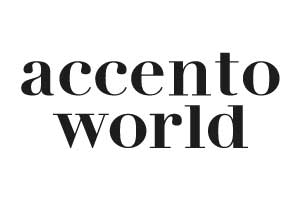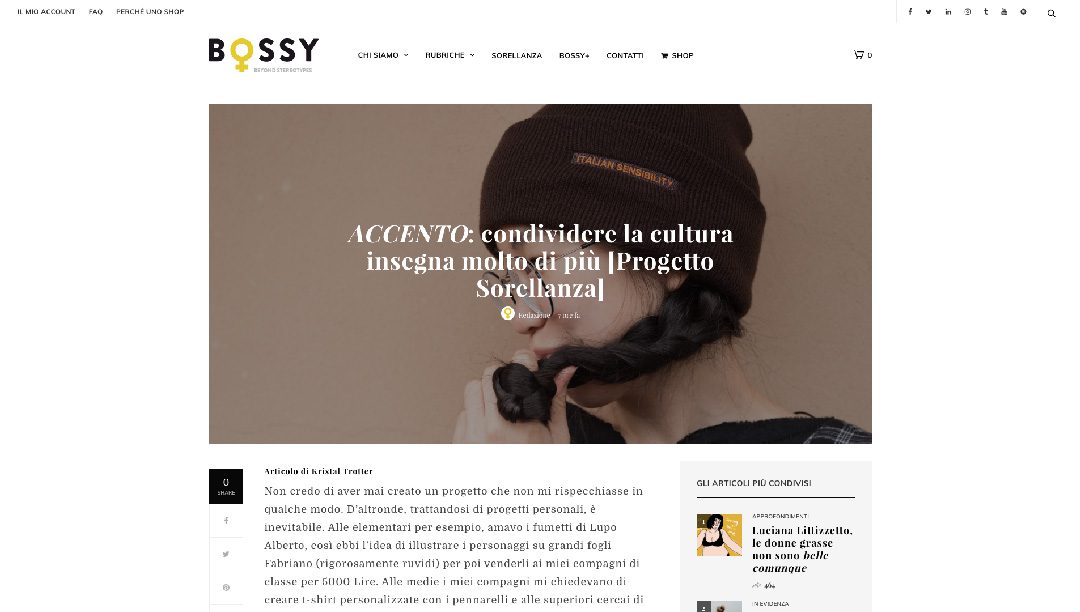BOSSY

Accento
Accento shares a path to culture on BOSSY
created by Accento
[ENG]: Our Co-Founder Kristal Trotter shares her path to the creation of Accento on BOSSY, an Italian intersectional feminist platform, for the Sorellanza project. Read the original post HERE.
[ITA]: La nostra Co-Fondatrice Kristal Trotter condivide la sua strada verso la creazione di Accento su BOSSY, una piattaforma femminista intersezionale italiana, per il progetto Sorellanza. Leggi il post originale QUI.
I don’t think that I’ve ever created a project that didn’t reflect me in some way.
After all, being personal projects, it’s inevitable. In elementary school, for example, I loved reading Lupo Alberto comic books, so I had this idea to illustrate the characters on big Fabriano paper (rigorously rough) and sell them to my classmates for 5000 Lire. In middle school my classmates would ask me to create personalized t-shirts with markers and in High School I tried to create an artistic collective with my friends, organizing small events around the city with the intention of showcasing our abilities. I couldn’t understand why I would insist on giving myself these projects, surely these initiatives didn’t have solid foundations to last, but I couldn’t help it.
Now that I am in my early 30s, I find myself creating another project, but this time the feeling is different, the foundation is stronger.
ACCENTO.WORLD is a platform that wants to talk about well-rounded Italian culture and it has an important message to share – try to understand what are the characteristics that make a person Italian and be open to understanding what idea people have of Italy. As you can imagine this is a very ambitious project.
If a personal project reflects you, it goes hand in hand with your personal growth; it doesn’t move forward if you stand still. Since life lacks a map that guides everyone towards individual growth, I will illustrate my path that brought me to Accento; a road that is far from being paved, but is a good trail to follow.
I left the Bel Paese in search of job opportunities in the United States and I found myself achieving more than I could have ever imagined. Sometimes this is how it happens, you find what you need, but not what you are looking for, by chance.
With all probability my first move was predictable or maybe it was wrong: I started to compare everything to Italy – from the food to the fashion, all the way to the mannerisms of the locals. It’s not easy to leave everything you know behind and think that the transition in a new country is a walk in the park.
I find myself talking to Italian-Americans, who have never been to Italy and with an idea of Italianness that has not gone beyond the 60s (best case scenario), and I am officially guilty of a feeling of greater authenticity that I can’t get rid of. I don’t recognize the Italy that they dream of, mostly holding on to the descriptions passed on by their predecessors who emigrated from our country in search of fortune.
I met students who were learning Italian in college and they tell me that they learn our customs and traditions watching old classics like ‘Bicycle Thieves’ and listening to opera music. So, the Italy they idealized and still do in 2019 is only classical and in black and white. Interesting.
When I make new acquaintances and I tell them that I’m Italian, the continuous surprise of these people baffles me to a point that I make considerations that I didn’t feel the need to make before.
Here I find myself making my second move, which is usually in the right direction. Everything starts with a question and if you are lucky, the answer will lead to other questions. America has a very direct and shameless way of making you deal with the matter of identity; a subject that you can’t hide from considering that it is constantly sprinkled in our everyday lives: it’s talked about in TV, you can find it on forms that you occasionally have to fill out, it appears in casual conversations.
It’s time to reveal that I am Italian-American and if I’ve achieved what I wanted, at this point of the story, it doesn’t make a difference to you. It’s a small detail if you eat, drink and breath Italy for all of your formative years. By now it doesn’t matter where you go in the world, the society in which you grew up is home.
Let’s get to the question that started it all – what determines someone’s Italianness? We are human beings and as such, I think that we are all guilty of the arrogance in presuming that we have all the right answers, and a perspective that rotates around our reality. This obviously has its limits; limits that can veil details that are irrelevant to us, like for example the fact that I am also African-American. Small detail, evidently just for me.
Wait – did you already forget that I would read Lupo Alberto comics in elementary school? Comic book that I would religiously buy with coca-cola flavoured goleadors at the newsstand.
How do you identify yourself? It’s a question that was asked to me a lot in these last few years, but the answer is not as direct as the questions suggests. We are all multidimensional and we are not just one thing. Not acknowledging it doesn’t hide this fact. Italian-American, Afro-Italian, Italian, Afropean, which one should I choose? Sometimes having to identify yourself is needed so that others can identify you; in a perfect world we would all call each other by name without the need for so many explanations.
Now that I look back, I recognize where my arrogance was, luckily not in my ways, but in my thoughts. Whoever talks about authenticity doesn’t consider someone else’s life experiences and rejects realities different from their own.
In all honesty, analyzing my identity has helped me reflect and it has allowed me to see my multidimensionality without exclusions.
Furthermore, the fact that an Italian-American like me had feelings of being authentically more Italian than other people suggests that what makes a person Italian is a life experience that nobody can take away from you, as much as many may be confused or disapprove.
In times like these, where there is a search for meritocracy based on aesthetic and blood in order to stay in a Country, I find interesting the total exclusion of the cultural aspect; a patrimony so rich that in order to be exported abroad, it depends on the soul, the education and the experience of people that are the result of that marvelous culture.
And here I return to Accento. The way in which we communicate, the passion with which we gesticulate and the continuous research of beauty that distinguishes Italian taste, are details that only a person that has lived this nation can have.
Accepting the love that other people have for your country is another step in the right direction.
The right questions can open the narrowest minds and Accento is trying to do just that.
Non credo di aver mai creato un progetto che non mi rispecchiasse in qualche modo. D’altronde, trattandosi di progetti personali, è inevitabile. Alle elementari per esempio, amavo i fumetti di Lupo Alberto, così ebbi l’idea di illustrare i personaggi su grandi fogli Fabriano (rigorosamente ruvidi) per poi venderli ai miei compagni di classe per 5000 Lire. Alle medie i miei compagni mi chiedevano di creare t-shirt personalizzate con i pennarelli e alle superiori cercai di creare un collettivo artistico con dei miei amici, per poi organizzare piccoli eventi in giro per la città con lo scopo di mettere in mostra le nostre capacità. Non capivo perché mi ostinassi a darmi dei progetti del genere: di certo queste iniziative non avevano basi solide per essere longeve, ma era più forte di me.
Adesso, alla soglia dei miei 30 anni, mi ritrovo ad aver creato un altro progetto, ma questa volta la sensazione è diversa, la base è più solida.
ACCENTO.WORLD è una piattaforma che vuole trattare di cultura italiana a 360 gradi e che ha un messaggio importante da condividere: cercare di capire quali siano le caratteristiche che rendono una persona “italiana” e quale sia l’idea che hanno gli altri dell’Italia. Come potete immaginare è un’idea molto ambiziosa.
Se un progetto personale ti rispecchia, riflette di pari passo la tua crescita personale; non avanza se tu sei fermo. Dato che la vita è sprovvista di una mappa che guidi ognuno di noi verso la crescita individuale, illustro il mio percorso che ha portato ad ACCENTO; una strada che è lontana dall’essere spianata, ma che è una buona scia da seguire.
Me ne andai dal Bel Paese in cerca di opportunità lavorative negli Stati Uniti e mi ritrovai a ottenere molto di più di quanto potessi immaginare. A volte succede così: trovi quello di cui hai bisogno, ma che non cercavi, per puro caso. Molto probabilmente il primo passo era scontato o forse sbagliato: incominciai a paragonare tutto all’Italia – dal cibo alla moda, fino ai modi di fare delle persone del posto. Non è facile lasciare tutto quello che si conosce e pensare che la transizione in un altro Paese possa essere una passeggiata.
Ho incontrato italoamericani, mai stati in Italia e con un’idea di identità italiana che si è fermata agli anni ‘60 (nel migliore dei casi) ed ecco che mi ritrovai ufficialmente colpevole di una sensazione di maggiore autenticità che non riuscivo a scrollarmi di dosso: non riconoscevo l’Italia che loro sognavano, prevalentemente aggrappati alla descrizione ereditata dai loro predecessori che emigrarono dal nostro Paese per cercare fortuna. Ho conosciuto studenti che studiavano l’italiano al college e mi dicevano che imparavano i nostri usi e costumi guardando vecchi classici come “Ladri di biciclette” e ascoltando musica lirica. L’Italia che loro mitizzavano e mitizzano ancora oggi nel 2019 quindi è solo classica e in bianco e nero. Interessante. Quando faccio nuove conoscenze e dico che sono italiana, la continua sorpresa delle persone mi sconcerta a tal punto da dover fare delle considerazioni di cui non ne sentivo il bisogno prima.
Ecco che mi sono ritrovata a fare il secondo passo che spesso è nella giusta direzione: tutto incomincia con una domanda e, se si è fortunati, la risposta porta ad altre domande. L’America ha un modo molto diretto e sfrontato di farti affrontare il tema dell’identità; un tema che non puoi evitare considerando che viene incessantemente spolverato nella vita di tutti i giorni: se ne parla in televisione, si trova nei moduli che occasionalmente devi compilare, compare nei discorsi quotidiani. È arrivato il momento di rivelarvi che sono italoamericana e se ho ottenuto quello che volevo, a questo punto della storia, a voi non cambia nulla. È un dettaglio di poco conto se mangi, bevi e respiri Italia per tutti i tuoi anni formativi. Non importa dove vai nel mondo, la società in cui sei cresciuto è casa.
Arriviamo alla domanda che diede inizio a tutto: cos’è che determina l’italianità di una persona?
Siamo esseri umani e, in quanto tali, credo che siamo tutti colpevoli della presunzione di avere tutte le risposte che gravitano intorno alla nostra prospettiva. Questo ovviamente ha i suoi limiti; dei limiti che possono velare dettagli che per noi sono irrilevanti, come per esempio il fatto che sono anche afroamericana. Piccolo dettaglio a quanto pare solo per me. Un attimo: vi siete già dimenticati che leggevo Lupo Alberto alle elementari? Fumetto che tra l’altro compravo religiosamente con le Goleador alla Coca-Cola in edicola.
Come ti identifichi? È una domanda che mi è stata posta spesso negli ultimi anni, ma la risposta non è diretta quanto la domanda suggerisce. Siamo tutti multidimensionali e non siamo solo una cosa. Non riconoscere questo fatto, comunque non ne nega la veridicità. Italoamericana, afroitaliana, italiana, afropean, quale devo scegliere? A volte doversi identificare serve affinché gli altri ti possano identificare; in un mondo perfetto ci basterebbe presentarci per nome senza dover dare troppe spiegazioni.
Adesso che guardo indietro, riconosco dov’era la mia presunzione; non nei modi, per fortuna, ma nel pensiero. Chi parla di autenticità non considera l’esperienza di vita degli altri e respinge realtà diverse dalle sue. In fondo però l’analisi della mia identità mi ha aiutato a riflettere e mi ha permesso di vedere tutta la mia multidimensionalità senza esclusioni. Per lo più, il fatto che un’italoamericana come me abbia avuto la sensazione di essere più autenticamente italiana di altri mi suggerisce che quello che rende una persona “italiana” è un’esperienza di vita che nessuno può toglierti, per quanto qualcuno possa essere confuso o disapprovare.
In tempi come questi, dove si è a caccia della meritocrazia estetica e sanguigna per poter stare in un Paese, trovo interessante la totale esclusione dell’aspetto culturale; un patrimonio così ricco che per essere esportato all’estero dipende totalmente dall’anima, dall’istruzione e dall’esperienza di persone frutto di quella cultura meravigliosa.
Ed ecco che ritorno ad ACCENTO. Il modo in cui comunichiamo, la passione con cui gesticoliamo e la continua ricerca della bellezza che contraddistingue il gusto italiano, sono dettagli che solo una persona che ha vissuto questa nazione può avere. Accettare l’amore che le persone hanno per il tuo Paese è solo un altro passo nella direzione giusta.
Le domande giuste possono aprire le menti più chiuse e ACCENTO cerca di fare proprio questo.




